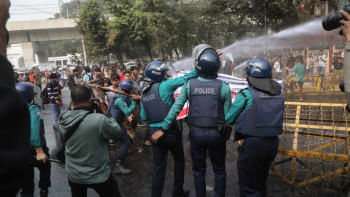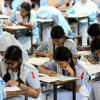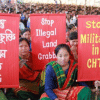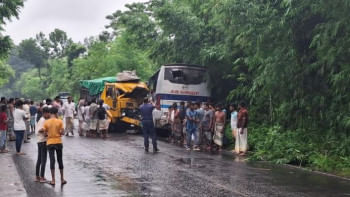The new Bangladesh must be inclusive

We strongly condemn Wednesday's attack on an Indigenous group and its supporters while they were protesting the removal of graffiti from textbooks featuring the word Adivasi. The assault, which left at least 20 people injured—including three Indigenous persons in critical condition—goes against the very spirit of the July uprising. We commend all, including student leaders, who unequivocally denounced this act of intolerance.
The incident reportedly occurred when the group "Aggrieved Indigenous Student-Masses" gathered in front of the National Curriculum and Textbook Board (NCTB) office in Motijheel to protest the textbook revision. Meanwhile, the attackers, under the banner of "Students for Sovereignty," had already taken position at the site. At one point, they swooped on the Indigenous group, hitting them with cricket stumps. One student, Rupaiya Shrestha Tanchangya, who had actively participated in the July uprising, was beaten so severely that she later required 12 stitches on her head.
Should this be the norm in a country where over 90 percent of the population belongs to the majority ethnic group? Should we not show greater responsibility in including minority voices in all important decisions and ensuring that their rights are protected—rather than deciding for them what they should or should not be called?
According to a report by The Daily Star, the violence could have been prevented had the police acted decisively. An eyewitness told Prothom Alo that police neither intervened to protect the Indigenous protesters nor restrained their attackers. However, just a day later, police were rather quick to deploy water cannons and sound grenades against activists marching toward the home ministry to protest Wednesday's attack. This raises the question: does everyone enjoy the same rights in the new Bangladesh?
The NCTB authorities, for instance, pandered to the whims of the "Students for Sovereignty" group when they demonstrated on Sunday for the removal of Adivasi graffiti from textbooks, making the change the very next day. They did not even see the need to consult all stakeholders before taking such a decision. Should this be the norm in a country where over 90 percent of the population belongs to the majority ethnic group? Should we not show greater responsibility in including minority voices in all important decisions and ensuring that their rights are protected—rather than deciding for them what they should or should not be called?
The attitude displayed by the attackers and police disturbingly echo the tendencies of the fascist regime which representatives of all ethnicities, religions, and genders united to overthrow just months ago. We urge the government to take a firm stance against anyone who fosters division, spreads false narratives against minorities, or violates the rights of others. It must hold Wednesday's attackers accountable, and protect the rights and dignity of ethnic minorities.


 For all latest news, follow The Daily Star's Google News channel.
For all latest news, follow The Daily Star's Google News channel. 










Comments